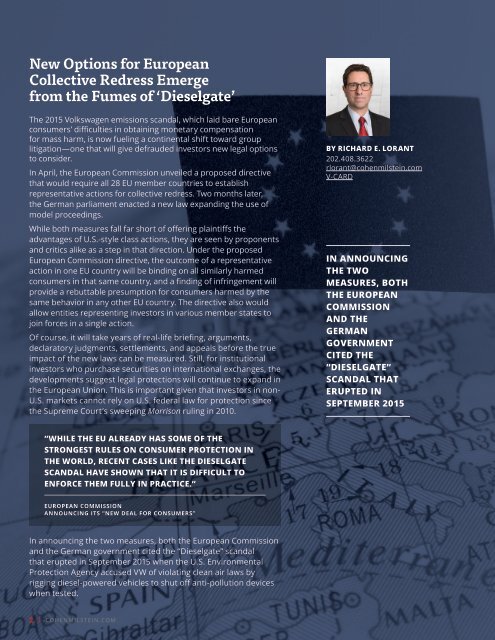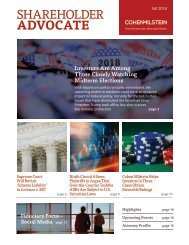Shareholder Advocate Summer 2018
You also want an ePaper? Increase the reach of your titles
YUMPU automatically turns print PDFs into web optimized ePapers that Google loves.
New Options for European<br />
Collective Redress Emerge<br />
from the Fumes of ‘Dieselgate’<br />
The 2015 Volkswagen emissions scandal, which laid bare European<br />
consumers’ difficulties in obtaining monetary compensation<br />
for mass harm, is now fueling a continental shift toward group<br />
litigation—one that will give defrauded investors new legal options<br />
to consider.<br />
In April, the European Commission unveiled a proposed directive<br />
that would require all 28 EU member countries to establish<br />
representative actions for collective redress. Two months later,<br />
the German parliament enacted a new law expanding the use of<br />
model proceedings.<br />
While both measures fall far short of offering plaintiffs the<br />
advantages of U.S.-style class actions, they are seen by proponents<br />
and critics alike as a step in that direction. Under the proposed<br />
European Commission directive, the outcome of a representative<br />
action in one EU country will be binding on all similarly harmed<br />
consumers in that same country, and a finding of infringement will<br />
provide a rebuttable presumption for consumers harmed by the<br />
same behavior in any other EU country. The directive also would<br />
allow entities representing investors in various member states to<br />
join forces in a single action.<br />
Of course, it will take years of real-life briefing, arguments,<br />
declaratory judgments, settlements, and appeals before the true<br />
impact of the new laws can be measured. Still, for institutional<br />
investors who purchase securities on international exchanges, the<br />
developments suggest legal protections will continue to expand in<br />
the European Union. This is important given that investors in non-<br />
U.S. markets cannot rely on U.S. federal law for protection since<br />
the Supreme Court’s sweeping Morrison ruling in 2010.<br />
BY RICHARD E. LORANT<br />
202.408.3622<br />
rlorant@cohenmilstein.com<br />
V-CARD<br />
IN ANNOUNCING<br />
THE TWO<br />
MEASURES, BOTH<br />
THE EUROPEAN<br />
COMMISSION<br />
AND THE<br />
GERMAN<br />
GOVERNMENT<br />
CITED THE<br />
“DIESELGATE”<br />
SCANDAL THAT<br />
ERUPTED IN<br />
SEPTEMBER 2015<br />
“WHILE THE EU ALREADY HAS SOME OF THE<br />
STRONGEST RULES ON CONSUMER PROTECTION IN<br />
THE WORLD, RECENT CASES LIKE THE DIESELGATE<br />
SCANDAL HAVE SHOWN THAT IT IS DIFFICULT TO<br />
ENFORCE THEM FULLY IN PRACTICE.”<br />
EUROPEAN COMMISSION<br />
ANNOUNCING ITS “NEW DEAL FOR CONSUMERS”<br />
In announcing the two measures, both the European Commission<br />
and the German government cited the “Dieselgate” scandal<br />
that erupted in September 2015 when the U.S. Environmental<br />
Protection Agency accused VW of violating clean air laws by<br />
rigging diesel-powered vehicles to shut off anti-pollution devices<br />
when tested.<br />
2 I COHENMILSTEIN.COM



